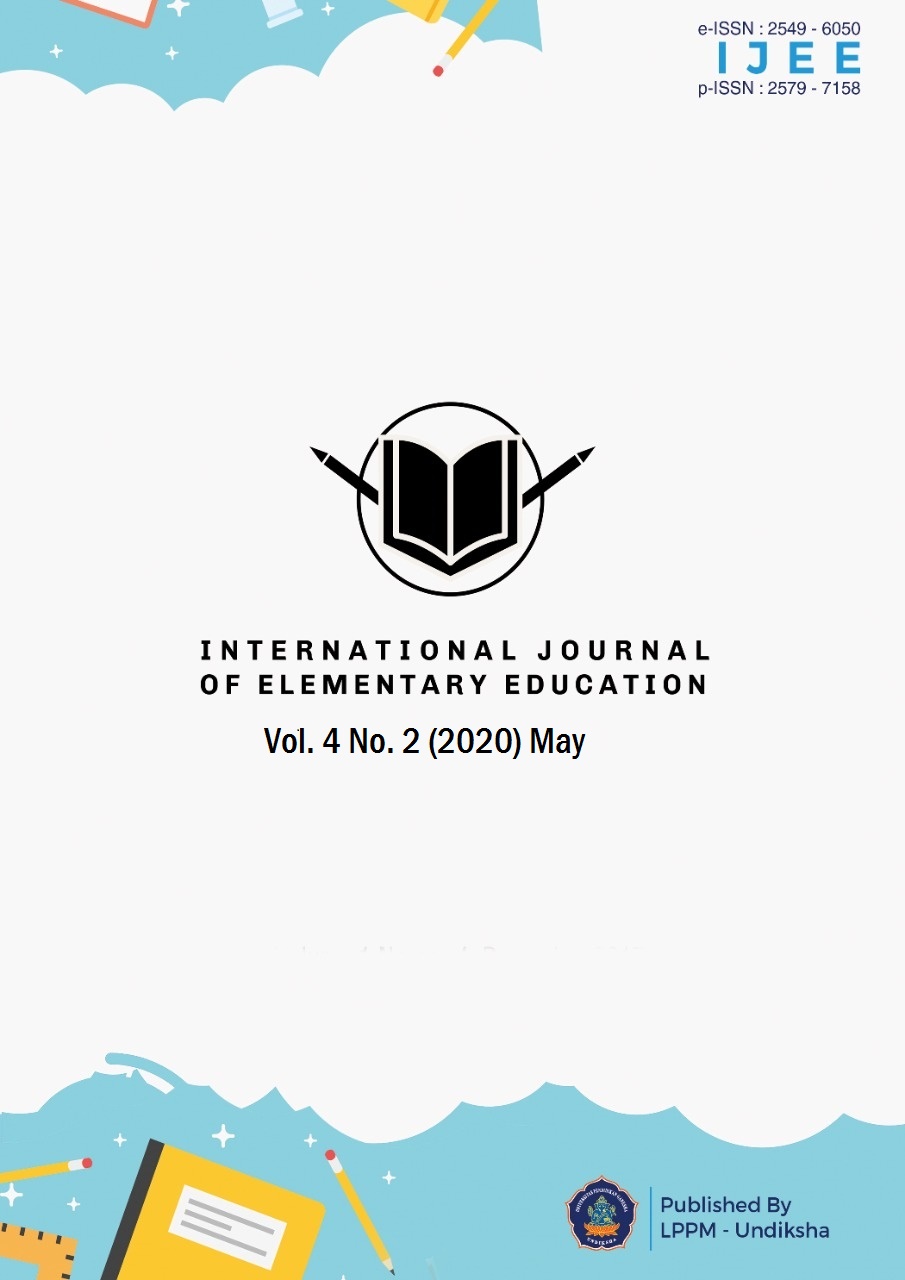Tri Hita Karana Oriented Problem Based Learning Improves Natural Science Learning Outcomes
DOI:
https://doi.org/10.23887/ijee.v4i2.25185Keywords:
tri hita karana, PBLAbstract
This research focused on the low learning outcomes of Natural Science students in class V.. The purpose of this study was to analyze the effect of the Tri Hita Karana oriented PBL model on the learning outcomes of the fifth grade Natural Science students. The sample in this study amounted to 56 students. In this study, data were collected using a test technique using an objective test instrument with multiple choice forms which had previously been analyzed for the quality of eligibility by testing the validity, reliability, distinguishing features, and level of difficulty. The data that has been obtained is then analyzed using t-test. Based on the results of the t-test analysis, T-count = 5.42, while the value of T-table at a significant level of 5% with degrees of freedom 28 + 28 - 2 = 54 is 1.67. Based on T-count = 5.42 > T-table = 1.67 then H0 is rejected. The results of the analysis prove that there are significant differences between the groups of students who are taught with the Tri Hita Karana oriented Problem Based Learning model with groups of students who are taught with conventional learning models. From the results of the t-test analysis and the average learning outcomes it can be concluded that The Tri Hita Karana oriented Problem Based Learning model has a positive effect on the Natural Science learning outcomes of Class V students. Therefore, the Tri Hita Karana oriented Problem Based Learning model is suitabel for dealing with low Natural Science learning outcomeReferences
Agung, A. A. G. (2010). Evaluasi Pendidikan. Singaraja: Undiksha.
Agung, A. A. G. (2010). Metodologi Penelitian Pendidikan, Suatu Pengantar. (FIP Undiksha Singaraja, Ed.). Singaraja.
Amir, & Haling, A. (2018). The Effect of Scientific Approach at Natural Science Learning on Elementary Students’ Learning Outcome 227(Icamr 2018). Advances in Social Natural Science, Education and Humanities Research (ASSEHR), 13–15. https://doi.org/https://doi.org/10.2991/icamr-18.2019.4
Ardaya, D. A. (2016). Penerapan Pendekatan Saintifik Untuk Kelas V Sekolah Dasar. Jurnal Pendidikan Guru Sekolah Dasar, I(I), 72–83.
Ardiansyah. (2017). Pengaruh Model Pembelajaran Problem Solving Terhadap Hasil Belajar IPA Siswa SD. MIMBAR PGSD Undiksha, 5(2), 1–11.
Ariadi, I. P. (2014). Pengaruh Model Group Investigation (GI) Terhadap Hasil Belajar IPA Siswa. E-Journal MIMBAR PGSD Universitas Pendidikan Ganesha, 2(1), 1–10. https://doi.org/https://doi.org/10.1145/302979.303168
Fauziyah. (2017). Pengaruh Model Pembelajaran Probing-Promting Terhadap Hasil Belajar Pada Tema 8 (Ekosistem) Siswa Kelas V SDN Wiyung I Surabaya. Jurnal Pendidikan Guru Sekolah Dasar, 5(5), 533–542.
Mahpudin. (2018). Peningkatan Hasil Belajar Ipa Melalui Metode Eksperimen Pada Siswa Kelas V Sekolah Dasar. Jurnal Cakrawala Pendas, 4(2), 1. https://doi.org/https://doi.org/10.31949/jcp.v4i2.1029
Mandra, I. W., & Dhammananda, D. (2020). Implementation Of Tri Hita Karana Teaching To Form Students Characters Quality. Jurnal Penjaminan Mutu, 6(1), 60. https://doi.org/https://doi.org/10.25078/jpm.v6i1.1300
Muakhirin, B. (2014). Peningkatan Hasil Belajar Ipa Melalui Pendekatan Pembelajaran Inkuiri Pada Siswa Sd. Jurnal Ilmiah Guru Caraka Olah Pikir Edukatif, 0(1).
Nurqomariah. (2015). Pengaruh Model Problem Based Learning Dengan Metode Eksperimen Terhadap Hasil Belajar IPA Fisika Siswa Kelas Vii. Jurnal Pendidikan Fisika Dan Teknologi, 1(3), 173–178.
Priani. (2018). Pengaruh Model Problem Based Learning (PBL) Berbantuan Media Gambar Terhadap Hasil Belajar IPA Siswa Kelas V Gugus III Kuta Utara Tahun Pelajaran 2017/2018. Mimbar PGSD, 6(1), 8–14.
Putra, I. W. G. Y. D. (2020). Pengaruh Sistem Pengendalian Internal , Budaya Tri Hita Karana Pada Kinerja Pemerintah. Jurnal Lingkungan & Pembangunan, 4(1).
Rusman. (2012). Model-model Pembelajaran. PT Raja Grafindo Persada.
Sanjaya. (2019). Utilization of Civic KVS-SAW Evaluation Model in Determining the Effectiveness of Tri Hita Karana in Character Education for Students on Elementary School of Bali Aga. Journal of Engineering and Applied Natural Sciences, 14(8), 2572–2581.
Saputra. (2018). Pengaruh Model Pembelajaran Problem Based Learning Berorientasi Tri Hita Karana Terhadap Hasil Belajar IPA Siswa Kelas V. Jurnal Pendidikan Multikultural Indonesia, 1(2), 51–61.
Setyosari. (2015). Metode Penelitian Pendidikan & Pengembangan. Prenadamedia Group.
Shofiyah. (2018). Model Problem Based Learning (PBL) Dalam Melatih Scientific Reasoning Siswa. Jurnal Penelitian Pendidikan IPA, 3(1), 33. https://doi.org/https://doi.org/10.26740/jppipa.v3n1.p33-38
Sohibun. (2014). Penerapan Strategi Belajar Dengar Lihat Kerjakan (DELIKAN) Berbasis Laboratorium Mini Terhadap Keterampilan Proses. Jurnal Imiah, 3(1).
Soviawati, E. (2011). Pendekatan Matematika Realistik (PMR) untuk Meningkatkan Kemampuan Berfikir Siswa di Tingkat Sekolah Dasar. Jurnal Penelitian Pendidikan, Edisi Khus(2), 154–163.
Suci, I. G. S. (2018). Higher Education Management Base on Tri Hita Karana: Case Study Hindu Higher Education Instution. International Journal of Mechanical Engineering and Technology, 9(8), 46–58.
Sulthon. (2016). Pembelajaran Ipa Yang Efektif Dan Menyenangkan Bagi Siswa Madrasah Ibtidaiyah (Mi). Elementary, 4(1), 38–54.
Wayan Weda Gustana Putra, I., Putu Parmiti, D., & Wayan Suwatra, I. I. (2016). Pengaruh Model Pembelajaran Savi Bermuatan Tri Hita Karana Terhadap Hasil Belajar Ipa Siswa Kelas IV. E-Journal PGSD Universitas Pendidikan Ganesha, 4(1).
Widura. (2018). Pengaruh Model Core Berbantuan Media Visual Terhadap Hasil Belajar IPA. Jurnal for Lesson and Learning Studies, 1(3), 258–26.
Downloads
Published
How to Cite
Issue
Section
License
Authors who publish with the International Journal of Elementary Education agree to the following terms:
- Authors retain copyright and grant the journal the right of first publication with the work simultaneously licensed under a Creative Commons Attribution License (CC BY-SA 4.0) that allows others to share the work with an acknowledgment of the work's authorship and initial publication in this journal.
- Authors are able to enter into separate, additional contractual arrangements for the non-exclusive distribution of the journal's published version of the work (e.g., post it to an institutional repository or publish it in a book), with an acknowledgment of its initial publication in this journal.
- Authors are permitted and encouraged to post their work online (e.g., in institutional repositories or on their website) prior to and during the submission process, as it can lead to productive exchanges, as well as earlier and greater citation of published work. (See The Effect of Open Access)









